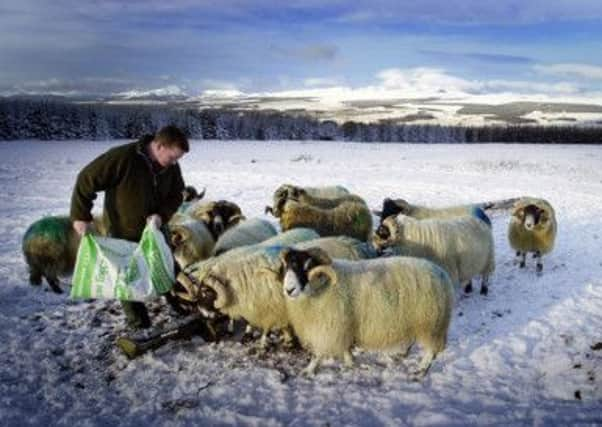Large hill farms could be winners under new CAP


With the country divided into two land classes, once the move to area payments had been completed basic payments on arable land and permanent pasture were likely to be in the region of €148 per hectare (£50 per acre) and on rough grazing around €16.60 (£5.60 per acre).
Greening payments of €76.4 per hectare (£25.80 per acre) or €8.58 per hectare (£2.90 per acre) respectively could be added where farmers complied with new regulations – and further top ups are likely to be available for young farmers as well as coupled headage payments for those who bred calves.
Advertisement
Hide AdAdvertisement
Hide AdFor many producers, a key part of the consultation was the inclusion of a “ready reckoner” which allows farmers to calculate how the proposals outlined would influence their own support payments.
However, it was made abundantly clear at the launch that the figures were dependent upon a number of issues which still had to be fully resolved, such as gaining a workable resolution on the Scottish clause from the European Commission and, perhaps just as importantly, the outcome of the consultation itself.
Some worked examples showed that, under the conditions laid out, a 150 hectare (370 acre) arable farm would get in the order of €33,400 (£27,920), while a 300 hectare (750 acres) mixed farm on hill land might expect €13,895. Large-scale extensive hill farms looked set to be considerable winners, however.
Key issues to be decided during the consultation include: whether the two payment regions will be sufficient; the term over which the change to area payments should be phased in; whether coupled payments should be extended beyond 8 per cent or beyond the suckler cow sector; and how greening measures will be implemented. With the consultation running until 17 March, farmers were urged to reply to the consultation by rural affairs secretary Richard Lochhead. He warned, however, that it was important the proposals struck the right balance between flexibility and simplicity.
“In this consultation I express my preference on many of the key issues and for others I have simply laid out what I see as the clear options. For instance, I am keen to see new entrants qualify for direct support from day one of the new CAP, and… maximising coupled support for the beef sector”, said the minister.
NFU Scotland communications director Bob Carruth said: “The consultation contains few surprises but will, with the inclusion of a ready reckoner, allow farm businesses to start mapping out what impact the move to an area-based scheme in the future will have on support payment levels.”
Battle moves to Brussels
The intensive bout of lobbying to win back some of the “lost” convergence cash for Scotland’s farmers continued yesterday.
Fury erupted in Scotland six weeks ago when the convergence uplift payment, worth €220 million over six years and awarded because of Scotland’s low per hectare farm payments, was split between farmers throughout the whole of the UK by Secretary of State Owen Paterson.
Advertisement
Hide AdAdvertisement
Hide AdSNP MEP Alyn Smith, industry stalwart John Cameron, George Milne of the National Sheep Association and Scott Walker, chief executive of NFU Scotland, were in Brussels yesterday to discuss the situation with top-level players at the European Commission.
“As we expected, the commission made it clear that distribution of funds is at the discretion of member states,” said Walker, “but that distribution must be done based on objective and non-discriminatory criteria.”
He said the union had submitted a Freedom of Information request asking the Westminster department of the environment, food and rural affairs to provide details on how it had arrived at its decision.
“We will follow up today’s meeting, seeking clarity on how quickly the outcome of any budgetary review in the UK can be brought into play.”
Walker said that the issue would be picked up again at the upcoming meeting with UK farm minister George Eustice: “It is clear that there remains the opportunity for the UK government to alter its decision on how it has chosen to allocate the budget convergence dividend. We will continue to press for parity in budgets between all the regions of the UK.”